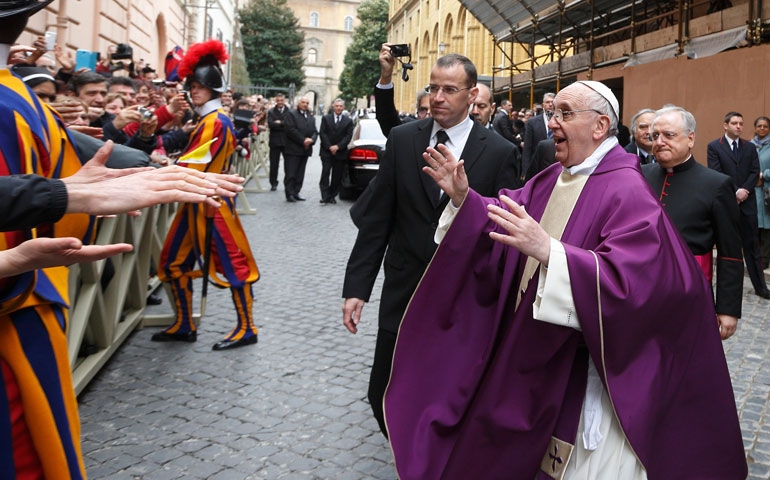
Pope Francis greets people after celebrating Mass at St. Anne’s Parish within the Vatican March 17. The new pope greeted every person leaving the small church and then walked over to meet people waiting around St. Anne’s Gate. (CNS/Paul Haring)
"Pope rides the bus home from conclave."
"Pope pays his own hotel bill."
Pope pets journalist's guide dog, opts for hand-me-down papal ring and -- gasp! -- sips mate with the president of Argentina. (Apparently tradition says the pope should not be seen consuming anything but the Eucharist.)
Such have been the headlines, tweets and memes about Pope Francis since the white smoke signaled his election on March 13.
In those first moments of his papacy, Catholics around the world were analyzing every gesture and decision for information about the somewhat surprising choice for our 266th pope: He skipped the ermine-trimmed cape, wore only white vestments, waved instead of greeting the crowd triumphantly and first asked for a blessing from the people. Even his initial moments of silence were taken to be indicative of his simplicity, spirituality and authenticity.
While some continued to plumb the meaning of black shoes versus red, other more substantial signs came during his first week as pontiff. He informally greeted parishioners after Mass at St. Anne's Parish (a Mass he walked to), gave a blessing in silence to journalists out of respect for the consciences of the non-Catholics, and asked Argentines to stay home from his installation and instead give the money to the poor (humorously captured in a meme that said, "Don't fly for me, Argentina"). More significant was someone who did come to the inauguration, the ecumenical patriarch of Constantinople -- a first since the Catholic-Orthodox split in 1054.
Progressive Catholics -- myself included -- were sharing these stories with the same glee Mary Magdalene must have had when spreading the word about the empty tomb -- minus the use of Facebook, of course. "Hey, have you heard? It's good news!"
Some conservative Catholics also admitted to "pope crushes," but the more ultra-orthodox were in a panic, especially over his preference for simplified liturgy. In one convoluted argument, a blogger at Rorate-Caeli noted that by choosing external "trappings" of humility, the new pope was in effect setting himself apart, which is an act of pride. One commenter compared her feelings to those she had after Obama was re-elected. Seriously. It was for these folks that the phrase "more Catholic than the pope" was coined.
It seems part of the reasoning is that if liberals are happy, then conservatives must be devastated. Such black-and-white thinking certainly is echoed by the mainstream media. But I have another theory, and it has to do with pre-conclave expectations. Many progressive Catholics, those of us Benedictine Sr. Joan Chittister described as weary and disillusioned with our church, most likely had pretty low expectations going into this conclave. Given that none of the cardinals could accurately be described as "liberal" pointed to, at best, more of the same or the likelihood of things getting worse.
I remember my shock and sadness in 2005 at the news of the election of Cardinal Joseph Ratzinger. This time, I was determined not to shed any tears, so I lowered my expectations almost to the ground, even blogging about how the identity of the new pope didn't really matter to me and my faith. When Jorge Mario Bergoglio was announced, I actually laughed -- out of surprise and gladness over my ability to regularly be so wrong.
On the other hand, more traditionalist Catholics assumed they had this election in the bag and are now dealing with their shattered expectations. The inverse of "Blessed is he who expects nothing, for he shall never be disappointed" (reportedly penned by poet Alexander Pope -- not to be confused with Pope Alexander) is that those with great expectations risk equally great disappointment.
Not all liberal Catholics have popped champagne, however, as the analysis of every word Francis has ever spoken or written continues. Does he see adoption by same-sex parents as child abuse, or is he a supporter of civil unions? Was he complicit in the "Dirty War," or did he do everything he could, given the circumstances? Did he speak out strongly against sexual abuse by priests, or did he protect abusers? Will he continue to act like a regular human being ("News at 10: Pope puts pants on one leg at a time!"), or will he become entrenched in the Vatican bureaucracy?
The answers may be "both/and." Let's remember, he is the pope, after all, not the second coming of Christ.
Still, while much remains to be seen, I think cautious optimism is in order. I'm cautious because, like anyone who has felt "abused" by a person or institution, my heart is somewhat guarded. But I am also optimistic, not only because the early signs are encouraging but because our faith calls us as Christians to remain hopeful.
Perhaps the biggest sign the new pope gave us is his choice of a name. St. Francis of Assisi is neither a "liberal" or "traditional" saint; he is in many ways "both/and." Perhaps the first pope to be his namesake will be truly "small-c" catholic, universally able to represent all of us by focusing on what is most important and something we can all agree on, care for the poor.
[Heidi Schlumpf teaches communications at Aurora University in the Chicago suburbs.]
